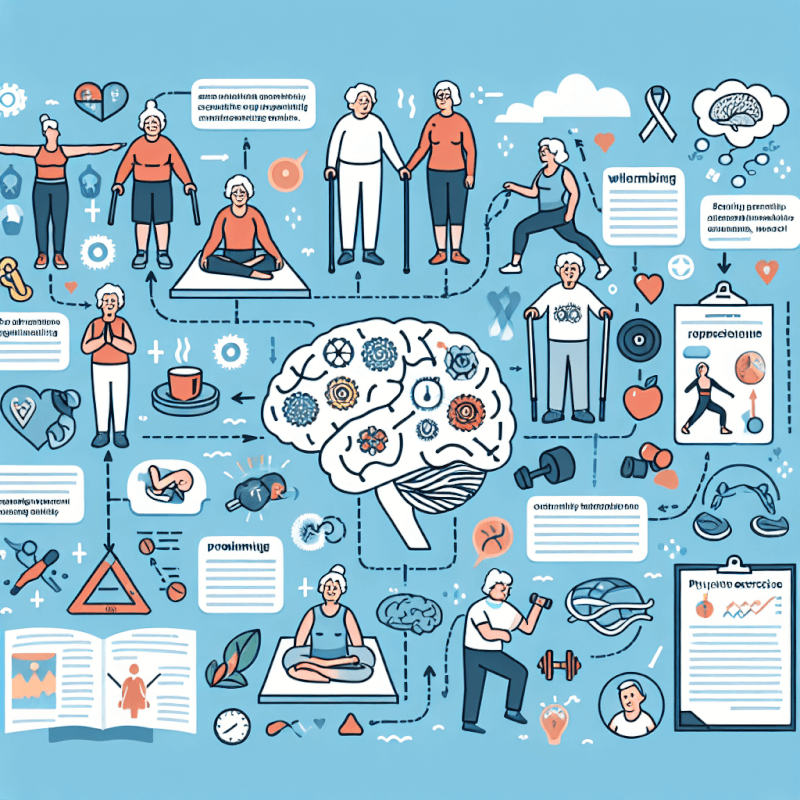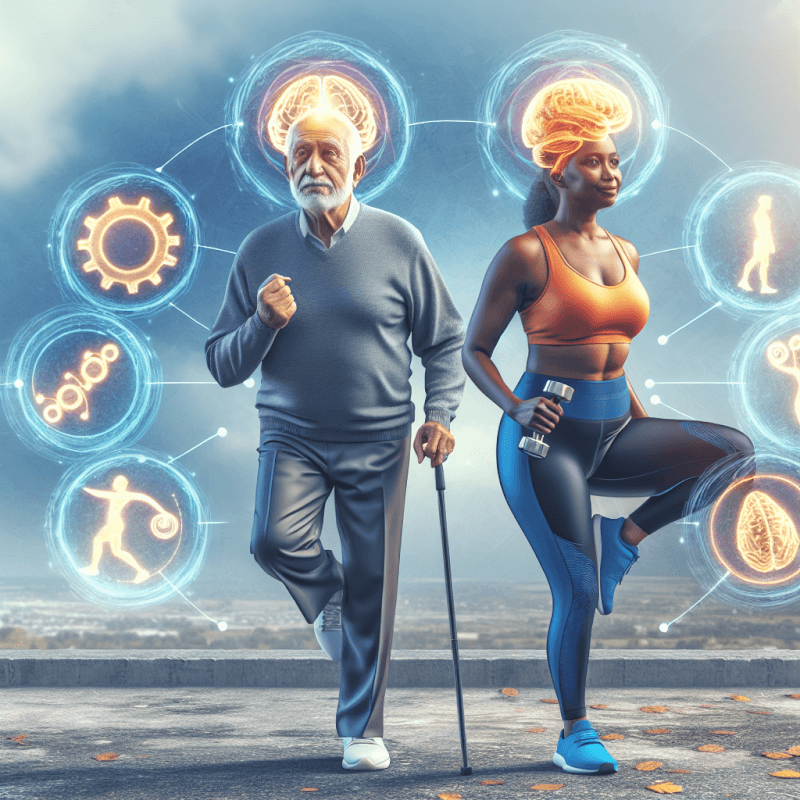Are you wondering if there are specific exercises that can help improve cognitive function in older adults? Well, you’re in the right place! This article will delve into the topic and provide you with valuable insights on whether certain exercises can make a difference in maintaining and enhancing cognitive abilities as we age. So, grab a cup of tea and get ready to discover the potential power of exercise in keeping your mind sharp and focused.

Benefits of Exercise for Cognitive Function
Regular exercise has been shown to have numerous benefits for cognitive function, particularly in older adults. Research studies have consistently shown a positive correlation between physical activity and improved cognitive abilities. Engaging in regular exercise not only improves physical health but also has a significant impact on brain health.
Research on Exercise and Cognitive Function
There have been extensive studies conducted on the relationship between exercise and cognitive function. These studies consistently demonstrate that engaging in exercise can lead to improvements in various cognitive domains, including attention, memory, learning, and executive function. Exercise has also been shown to reduce the risk of cognitive decline and age-related cognitive disorders, such as dementia.
Physical Exercise and Brain Health
Physical exercise has a direct impact on brain health by promoting the growth and survival of brain cells. When you exercise, blood flow to the brain increases, delivering oxygen and nutrients that are essential for optimal brain function. Exercise also stimulates the release of various chemicals in the brain, including neurotransmitters and growth factors, which promote the formation of new connections between brain cells.
Cognitive Benefits of Exercise
Engaging in regular exercise has been shown to have specific cognitive benefits. Aerobic exercise, in particular, has been found to improve attention, memory, and information processing speed. Strength training has also been shown to enhance cognitive function by improving executive functions, such as problem-solving and decision-making. Balance and coordination exercises can have a positive impact on cognitive function, as they require focus, concentration, and coordination. Mind-body exercises, such as yoga and tai chi, have been found to reduce stress and improve cognitive performance.
Types of Exercise That Improve Cognitive Function
Different types of exercise can improve cognitive function in various ways. It is important to include a variety of exercises in your routine to target different cognitive domains.
Aerobic Exercise
Aerobic exercise, also known as cardio exercise, involves activities that increase your heart rate and breathing. Examples of aerobic exercises include walking, jogging, cycling, swimming, and dancing. Aerobic exercise has been found to have positive effects on cognitive function, particularly on attention, memory, and information processing. Aim for at least 150 minutes of moderate-intensity aerobic exercise or 75 minutes of vigorous-intensity exercise per week.
Strength Training
Strength training, also known as resistance training, involves activities that strengthen your muscles. This can be done using weights, resistance bands, or bodyweight exercises. Strength training has been shown to improve executive functions, such as working memory, problem-solving, and decision-making. Include strength training exercises at least two days a week, targeting major muscle groups like the legs, arms, back, chest, and core.
Balance and Coordination Exercises
Balance and coordination exercises help improve your ability to control your body’s movements and maintain stability. These exercises often involve challenging your balance, such as standing on one leg, walking on a narrow beam, or using a balance board. Balance and coordination exercises require focus, concentration, and integration of sensory information, which can have a positive impact on cognitive function.
Mind-Body Exercises
Mind-body exercises, such as yoga, tai chi, and Pilates, combine physical movements with mental focus and breathing techniques. These exercises not only promote physical flexibility and strength but also improve cognitive function by reducing stress and enhancing relaxation. Mind-body exercises have been found to improve attention, memory, and overall cognitive performance.
Factors to Consider When Designing an Exercise Program
When designing an exercise program to improve cognitive function, it is important to consider several factors that can influence the effectiveness and safety of the program.
Individual Fitness Level
Consider your current fitness level when designing an exercise program. If you are just starting or have a low fitness level, start with activities that are less strenuous and gradually increase the intensity and duration over time. If you have been exercising regularly, you can choose more challenging exercises that can further enhance your cognitive function.
Physical Limitations and Health Conditions
Take into account any physical limitations or health conditions you may have. Consult with your healthcare provider before starting any exercise program, especially if you have any underlying medical conditions or concerns. They can provide guidance on exercises that are safe and appropriate for your specific needs.
Personal Preferences and Interests
Consider your personal preferences and interests when choosing exercises. Engaging in activities that you enjoy and find enjoyable increases the likelihood of adherence and long-term commitment to the exercise program. Whether it’s dancing, swimming, hiking, or playing a sport, find activities that bring you joy and incorporate them into your routine.
Frequency and Duration of Exercise
To reap the cognitive benefits of exercise, aim for regular physical activity. The American Heart Association recommends at least 150 minutes of moderate-intensity aerobic exercise or 75 minutes of vigorous-intensity exercise per week. You can spread your exercises across the week, engaging in 30 minutes of exercise on most days. Remember to allocate time for warm-up and cool-down exercises as well.
Progression and Variety in Exercises
As your fitness improves, it is important to progress your exercises to continue challenging your cognitive abilities. Gradually increase the intensity, duration, or difficulty of your exercises to avoid plateauing. Additionally, incorporating a variety of exercises into your routine can target different cognitive domains and prevent boredom.
Exercise Recommendations for Older Adults
Older adults can significantly benefit from regular exercise to maintain cognitive function and promote brain health. Various reputable organizations have provided guidelines and recommendations specifically for older adults.
Guidelines from Reputable Organizations
The World Health Organization (WHO) recommends that older adults aged 65 and above engage in at least 150 minutes of moderate-intensity aerobic exercise or 75 minutes of vigorous-intensity exercise per week. This should be combined with muscle-strengthening activities on two or more days per week, targeting major muscle groups. The American Heart Association and the American College of Sports Medicine provide similar exercise recommendations for older adults.
Specific Exercises Recommended for Cognitive Function
For older adults looking to improve cognitive function, a combination of aerobic exercise, strength training, balance and coordination exercises, and mind-body exercises is recommended. Incorporate activities such as brisk walking, cycling, resistance training, yoga, and tai chi into your routine to target different aspects of cognitive function.
Examples of Exercise Programs for Older Adults
An example of an exercise program for older adults aimed at improving cognitive function may include:
Warm-up: Start with 5-10 minutes of gentle aerobic exercise, such as walking or stationary cycling, to raise your heart rate and warm up your muscles.
Aerobic Exercise: Engage in 30 minutes of moderate-intensity aerobic exercise, such as brisk walking or cycling, on most days of the week.
Strength Training: Perform strength training exercises targeting major muscle groups, such as squats, lunges, push-ups, and bicep curls, two or more days per week. Start with light weights or resistance bands and gradually increase the intensity.
Balance and Coordination Exercises: Incorporate balance exercises, such as standing on one leg, heel-to-toe walk, or yoga poses like the tree pose, into your routine. Practice these exercises two or more days per week to improve cognitive function.
Mind-Body Exercises: Include mind-body exercises, such as yoga or tai chi, in your routine to reduce stress and improve cognitive performance. Aim for at least two sessions per week.
Cool-down: Wrap up your exercise session with 5-10 minutes of gentle stretching to improve flexibility and promote relaxation.

Important Considerations and Precautions
While exercise is generally safe and beneficial for older adults to improve cognitive function, it is essential to consider some important precautions and guidelines.
Safety Precautions for Older Adults
When engaging in exercise, it is crucial to prioritize safety, especially for older adults. Start with low-impact exercises and gradually progress to higher intensity activities. Pay attention to proper form and technique to avoid unnecessary strain or injuries. Use supportive equipment, such as proper footwear or walking aids, if necessary, and choose exercise environments that are safe and well-maintained.
When to Seek Medical Advice
If you have any underlying health conditions or concerns, it is recommended to consult with your healthcare provider before starting an exercise program. They can provide personalized recommendations and guidance based on your specific health needs. Additionally, if you experience any unusual symptoms or discomfort during exercise, such as severe pain, dizziness, or shortness of breath, seek medical advice promptly.
Interaction Between Exercise and Medication
If you are taking medication, it is important to be aware of any potential interactions between the medication and exercise. Certain medications may affect your heart rate, blood pressure, or balance, making certain exercises unsuitable or requiring additional precautions. Consult with your healthcare provider or pharmacist to ensure that exercise is safe and appropriate considering your medications.
Incorporating Cognitive Training into Exercise Programs
Combining exercise with cognitive training can further enhance cognitive function and provide additional benefits for older adults.
Benefits of Combining Exercise and Cognitive Training
The combination of exercise and cognitive training has been shown to have synergistic effects on cognitive function. Cognitive training exercises, such as puzzles, memory games, and brain teasers, enhance cognitive abilities like attention, memory, and problem-solving. When combined with exercise, these cognitive training activities are believed to stimulate the brain and enhance neural connections, leading to improved cognitive function.
Types of Cognitive Training Exercises
Cognitive training exercises can take various forms. They can include activities that challenge memory, attention, reasoning, and problem-solving skills. Examples of cognitive training exercises include crossword puzzles, Sudoku, jigsaw puzzles, memory games, reading, and learning a new language or musical instrument.
Examples of Integrated Exercise-Cognitive Training Programs
Integrated exercise-cognitive training programs combine physical exercise with cognitive training activities. These programs often involve exercises that incorporate cognitive tasks or challenges while engaging in physical activity. For example, walking while solving math problems or performing strength training exercises while memorizing sequences of numbers. These programs aim to simultaneously stimulate the body and the mind, providing a comprehensive approach to cognitive fitness.

Challenges and Potential Solutions
While exercise has numerous benefits for cognitive function, there are some challenges that individuals may face when attempting to engage in regular exercise.
Motivation and Adherence to Exercise
Maintaining motivation and adhering to an exercise program can be challenging for some individuals, especially when starting a new routine. To address this, it can be helpful to set realistic goals, track progress, and find an exercise buddy or group for accountability and support. Celebrate small achievements along the way and find ways to make exercise enjoyable, such as listening to music or incorporating activities you genuinely enjoy.
Availability of Suitable Exercise Programs
Finding suitable exercise programs, particularly for older adults, can be a challenge depending on the availability of resources in your community. However, there are various options to explore, such as community centers, senior centers, local gyms, and online resources. Look for programs specifically designed for older adults or consult with fitness professionals who can provide guidance on appropriate exercises.
Addressing Cognitive Decline and Aging-Related Changes
Cognitive decline and age-related changes can present additional challenges when trying to improve cognitive function through exercise. It is essential to adjust expectations and understand that the benefits may vary individually. Consulting with healthcare professionals or specialists in geriatric fitness can be beneficial in tailoring exercise programs to address specific cognitive concerns and age-related changes.
The Role of Social Engagement in Cognitive Function
In addition to exercise, social engagement also plays a critical role in maintaining cognitive function, particularly in older adults.
Social Interaction and Cognitive Health
Social interaction has been shown to have a positive impact on cognitive health. Engaging in social activities and maintaining strong social connections have been associated with a reduced risk of cognitive decline and dementia. Social engagement provides mental stimulation, emotional support, and opportunities for cognitive engagement, all of which contribute to better cognitive function.
Group Exercise Programs
Participating in group exercise programs is an excellent way to combine physical activity with social engagement. Group exercise classes or activities provide opportunities for social interaction, support, and camaraderie. It allows individuals to connect with others who share a common interest in improving their cognitive function while enjoying the benefits of exercise together.
Community Resources and Support
Communities often offer various resources and support systems for older adults looking to engage in exercise and maintain cognitive function. Local senior centers, community centers, and fitness facilities may provide exercise classes tailored to older adults. Additionally, community organizations and support groups focused on healthy aging can offer valuable resources, information, and social connections.

Measuring and Assessing Cognitive Improvements
Tracking cognitive improvements resulting from exercise can provide valuable insights and motivation to continue engaging in regular physical activity.
Cognitive Assessments for Older Adults
Cognitive assessments are designed to evaluate various aspects of cognitive function and provide a baseline for measuring improvements. These assessments may involve tasks and tests that assess memory, attention, language, and other cognitive domains. Healthcare professionals or neuropsychologists can conduct comprehensive cognitive assessments to determine areas of strength and areas that may benefit from targeted interventions.
Tracking Progress and Changes
To track progress and changes in cognitive function, consider using cognitive assessment tools or self-report measures. Keep a record of your exercise routines, cognitive training activities, and cognitive performance over time. This record can help identify patterns, improvements, and areas for further focus and adjustment.
Long-Term Benefits of Exercise on Cognition
Regular exercise has been shown to provide long-term benefits for cognitive health. Engaging in a consistent exercise routine can help maintain cognitive function as you age and reduce the risk of age-related cognitive decline and disorders. By incorporating exercise into your lifestyle and making it a lifelong habit, you can reap the rewards of improved cognitive function and overall well-being.
Conclusion
Exercise is a powerful tool for improving cognitive function, particularly in older adults. Regular physical activity, including aerobic exercise, strength training, balance and coordination exercises, and mind-body exercises, has been shown to enhance attention, memory, learning, and executive function. By considering individual factors, incorporating cognitive training, addressing challenges, and embracing social engagement, you can design an exercise program that promotes cognitive health and overall well-being. Remember, it’s never too late to start reaping the cognitive benefits of exercise, so lace up your sneakers, find activities you enjoy, and embark on a journey toward a healthier brain and a sharper mind.



